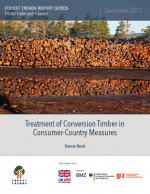Treatment of Conversion Timber in Consumer-Country Measures
By Duncan Brack View PublicationOver the last decade, governments in timber-producing and timber-consuming countries have implemented a range of policies and measures aimed at improving forest governance and reducing illegal logging. Although these have had
some impact, illegal logging clearly remains a significant problem. Conversion timber deriving from natural forests converted to commercial concessions is the predominant source of
timber in many countries; these concessions are often closely associated with land-use conflicts with local communities, stemming from unclear rights, access or land tenure arrangements. The legal issues surrounding land tenure and resource rights and the management of the allocation of concessions may often be the most important
areas of concern for forest law enforcement and governance.
The quasi-legal nature of land allocation processes and the implementation of land reforms often make it difficult to prove illegality. This therefore potentially adds a level of uncertainty to the various supply chain controls being implemented by consumer countries. Those which focus on illegality rather than sustainability tend not to deal
directly with conversion timber, though they do sometimes cover questions of land tenure and ownership. Those that aim to source sustainable (as opposed to legal) products generally do cover conversion timber, though the design of these policies has often caused some controversy.
It is possible, then, that timber products identified as legal may nevertheless originate from timber produced from natural forests converted to commercial concessions with questionable legal ownership or tenure rights. This paper
examines the treatment of such conversion timber under the various certification, licensing, procurement and supply chain control measures currently being implemented.

